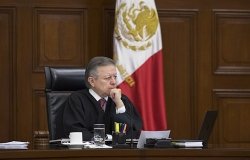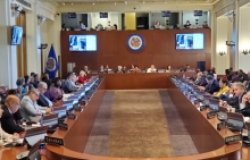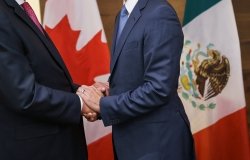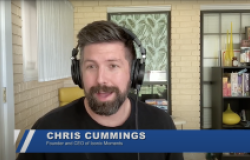A Comprehensive Counter-Terrorism Strategy
The U.S. faces a generational threat from catastrophic terrorism. Former Congressman Lee Hamilton outlines a long-term, comprehensive counter-terrorism strategy.
The United States is engaged in a generational struggle against a catastrophic terrorist threat. There is no quick fix or victory to be won. We need a clear, comprehensive and sustainable counter-terrorism strategy.
To succeed, we must avoid misunderstanding the nature of the conflict. We are not engaged in a clash of civilizations or a war against the tactic of terrorism. Both of those definitions are too broad, and those conflicts unwinnable. Nor are we engaged in a fight against a fixed group of terrorists, or a small collection of states that sponsor terrorism. Both of those definitions are too narrow, and fail to encompass the expansive nature of the threat.
Our enemy is twofold: al Qaeda, a stateless network of terrorists that struck us on September 11, 2001; and a radical ideological movement in the Islamic world, inspired in part by al Qaeda, which has spawned terrorist groups and violence across the globe. The first enemy is weakened, but continues to pose a grave threat; the second enemy is gathering, and will menace American people and interests long after Osama bin Laden and his cohorts are killed or captured. Thus our strategy must match our means to two ends: dismantling the al Qaeda network, and the longer-term goal of prevailing over the ideology that gives rise to terrorism.
What should this strategy look like? First, it must be balanced. The first phase of our post-9/11 efforts rightly included robust military action to topple the Taliban and pursue al Qaeda. But while military might can destroy terrorists and their safe havens, it cannot bear burdens as diverse as tracking down funds and changing hearts and minds. Long-term success demands all elements of national power – diplomacy, intelligence, covert action, law-enforcement, economic policy, foreign aid, public diplomacy, and homeland defense. If we favor one tool while neglecting others, we leave ourselves vulnerable, and miss an opportunity to deploy America's full arsenal of power.
These efforts must be integrated. We cannot succeed if the tools of government work in isolation from, or conflict with, one another. We need focused institutions; White House coordination of our institutions of government; leaders who set clear priorities; and vigorous Congressional oversight. Just as we tailored our government to uniformly fight Communism through areas as diverse as military strength, Voice of America, the Peace Corps, and overseas libraries and cultural centers, so, too, must we fashion a government that works as one to counter current threats.
We must also integrate our efforts with friends and allies. We face an enemy that germinates in the cities of Europe, the deserts of Africa, and the islands of Southeast Asia. We cannot possibly root out this enemy alone. We need vigorous bilateral cooperation in everything from law enforcement to aid programs. And we need a multilateral framework that multiplies our strength – through reinvigorated and reformed Cold War era alliances and institutions; a new institution to facilitate dialogue and cooperation between the Islamic world and the West; and new agreements to combat the nexus of terrorism and the proliferation of catastrophic weapons.
Most importantly, we need to be a force for hope in the Islamic world. Millions of young Muslims grow up lacking political freedom, economic opportunity and hope. Instead of practical schooling, they often receive unrelenting messages of hatred and fanaticism, and a tragic distortion of religion. They are taught to see America as sponsor of the world's ills and their personal suffering, and Islam as a means for war. Reversing this trend will take time, effort and resources – reconsideration of some of our alliances; outreach to moderate voices; support for educational reforms; the expansion of trade, jobs and opportunity; gradual political change; and the resolution of protracted conflicts.
Our overriding advantage is our message. Where the terrorists offer death, destruction, and regression, we can offer life, opportunity, progress, and hope. A balanced, integrated, and international strategy must work consistently and persistently towards the realization of that message through the strengthening of Muslims who share these goals. They, not the terrorists, must win the clash within Islamic civilization. We must not seek an American empire; we should seek a world where American values thrive, and others benignly pursue their own definitions of liberty and happiness.
Terrorists threaten our lives, our economic well-being, and an international system built largely in our image. To defeat this threat, we must project our best hopes, not our worst fears. Success will require the informed consent and sustained support of the American people. That support will be forthcoming if our effort is focused, our sacrifice shared, and our cause just.










